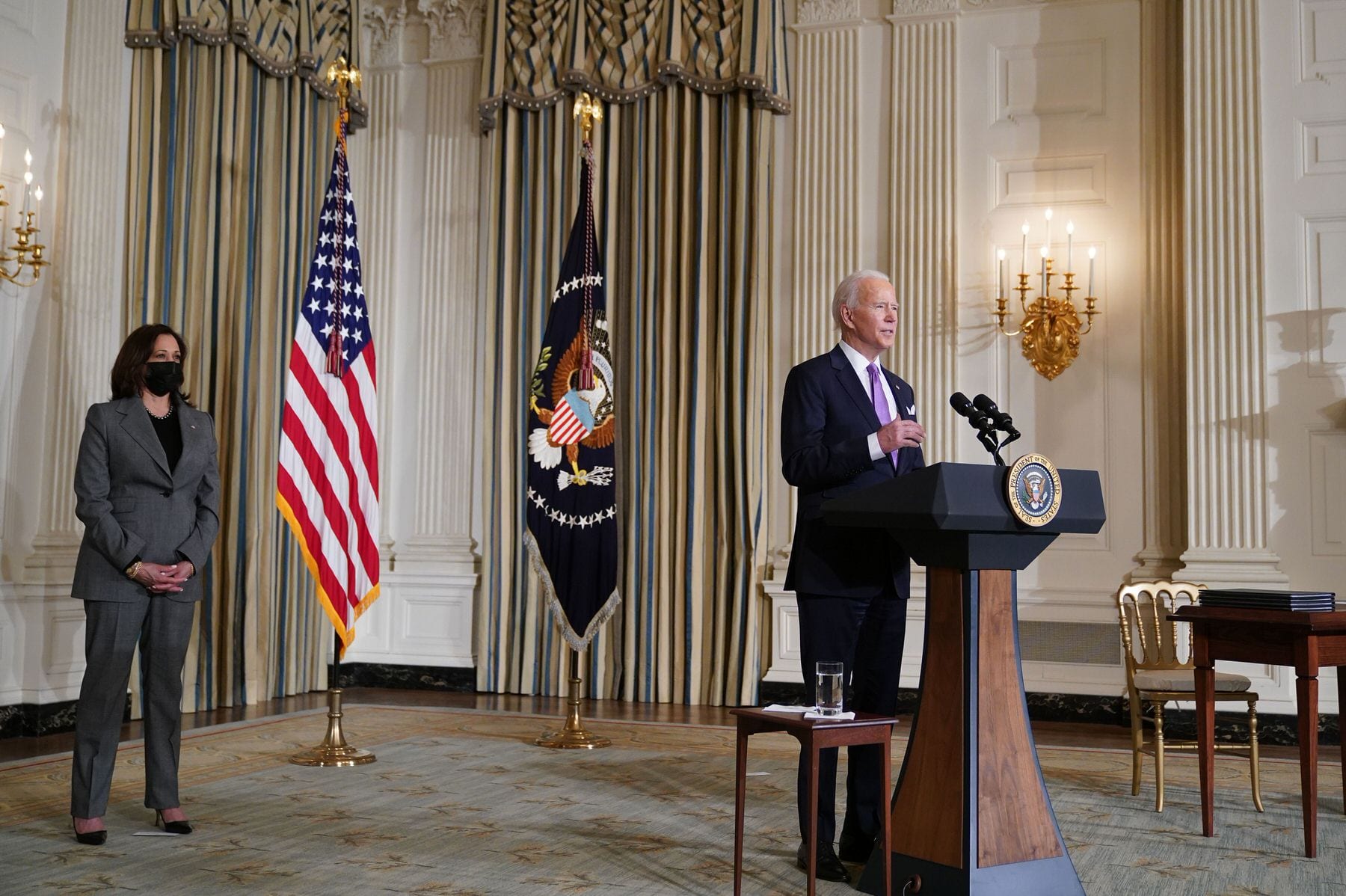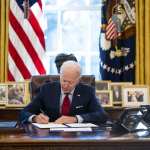Six days after taking office, President Joe Biden framed the need to address racial equity as part of his effort to unite the country, telling the country that “our soul will be troubled as long as systemic racism is allowed to persist,” echoing his campaign rhetoric on a “battle for the soul of America.”
On Tuesday, Biden issued four executive orders aimed at addressing racial disparities in housing and criminal justice, reestablishing the government’s relationship with the Native American community and confronting the xenophobia toward Asian Americans that has been exacerbated during the coronavirus crisis.
“Racial inequality has plagued our nation for too long,” Biden told reporters before signing the orders as Vice President Kamala Harris looked on. He added that the racial reckoning sparked by the unrelenting killing of Black Americans by police and vigilantes in a pandemic was “a knee on the neck of justice” that “marked a turning point in this country’s attitude towards racial justice.”
“The ground has shifted,” Biden said.
A diverse set of voters, particularly Black, Latinx and Native American voters, were part of the coalition that delivered victory to Biden in November, with many of them prioritizing racial justice as a motivating factor. Civil rights groups, activists and organizers who pushed for racial equity as a governing priority in 2020 welcomed Biden’s tone and a reframing of racial issues, long a source of political division in the country, as tied to Americans’ shared fate. But they said the orders were a start, not the end to the effort to address inequities.
“He came across as real about what he’s promised,” said Black Women’s Roundtable President Melanie Campbell, who was among several civil rights leaders who met with Biden and Harris during the transition. “Hearing him say those words and not skirt around it is important. As someone who helped to mobilize Black women, it is refreshing to hear him start these first 100 days sharing his priorities with those who put him in office and those who didn’t.”
Domestic policy adviser Susan Rice, who is charged with addressing racial equity directly in her role, said Tuesday that Biden “has committed the whole of our government to advance racial justice and equity for all Americans.”
Care in Action executive director Jess Morales Rocketto called Biden’s actions “a big step that makes clear the power of women of color and the surge of progressive political organizing.”
“He is leading with racial equity,” said Rocketto. “This is pretty unprecedented, and I don’t think this is what people think of when they think about Joe Biden’s policy priorities.”
Federal agencies will be required to conduct baseline assessments of how they are performing on key metrics of equity and will be required to report back with their initial findings within the first 200 days of the administration. The data will serve as the foundation for potential policy changes, quantifying a range of historical and societal inequities.
Officials said Harris, the first Black American and Asian American to serve in her role, who made addressing racism a central theme during her time as a senator and in her own presidential bid — was involved in shaping the executive orders and their implementation.
Sunny Red Bear, director of racial equity at the NDN Collective, said she is hopeful the Biden-Harris administration will center Native voices in the conversation and policy around racial equity.
“White supremacy and racism is rooted in policy,” said Red Bear, who added her organization will launch a campaign later this year to specifically address housing and mass incarceration of Native Americans. “I feel like this is another opportunity to advance the work of grassroots movements, and we hope the Biden administration continues to be in good relationship with our tribes and goes further than surface level actions.”
Officials said the administration will also work with Congress on legislation on the same issues. Executive orders do not have the permanency of federal legislation and can often symbolize the push-pull of partisan politics at the federal level. In keeping with other orders issued during his first week in office, Tuesday’s directives are also in part meant to undo policies of former president Donald Trump.
Biden directed the Department of Housing and Urban Development to examine the Trump administration’s “regulatory actions that undermined fair housing policies and laws” and “to take steps necessary based on that analysis to fully implement the Fair Housing Act’s requirements.”
Biden also directed the next attorney general “not to renew Department of Justice contracts” with private prisons, a process started during Barack Obama’s presidency but abandoned during the Trump administration. The president has nominated Merrick Garland to lead the Justice Department, but he has not yet been confirmed.
Judith Browne Dianis, executive director of the civil rights organization Advancement Project, commended the prison executive order but said it “should only be the first step in dismantling institutions of systemic racism and transforming them.”
“Still, to truly tear down systems of oppression, the Biden-Harris Administration must do more to address mass incarceration in public prisons and ICE-led detention centers — not only private prisons,” Dianis said in a statement.
Addressing two groups directly, Biden said the federal government would work toward “re-establishing federal respect for Tribal sovereignty, strengthening the Nation-to-Nation relationship between the federal government and American Indian and Alaska Native Tribes” and “engage in regular, robust, and meaningful consultation with Tribal governments.” He also directed the Department of Health and Human Services “to consider issuing guidance describing best practices to advance cultural competency, language access, and sensitivity” toward Asian Americans in the federal government’s COVID-19 response, and for the Justice Department to work with Asian American communities to prevent hate crimes and harassment.
Activists and organizers say they will continue to push for accountability from the new administration to make sure their early goals translate into action.
Alicia Garza, co-creator of Black Futures Lab, said she has “had several conversations” with Harris about the priorities of Black voters and has pushed for data collection.
“The previous administration tried to gaslight us into believing that racism doesn’t exist and that even talking about racism is unpatriotic,” she said. “We’re seeing the initial steps to really get a fuller picture of how it is that the rules have been rigged for generations, and what the impact of those rigged rules have been.”
Correction: An earlier version of this article misstated the day these orders were signed. It was Tuesday.





